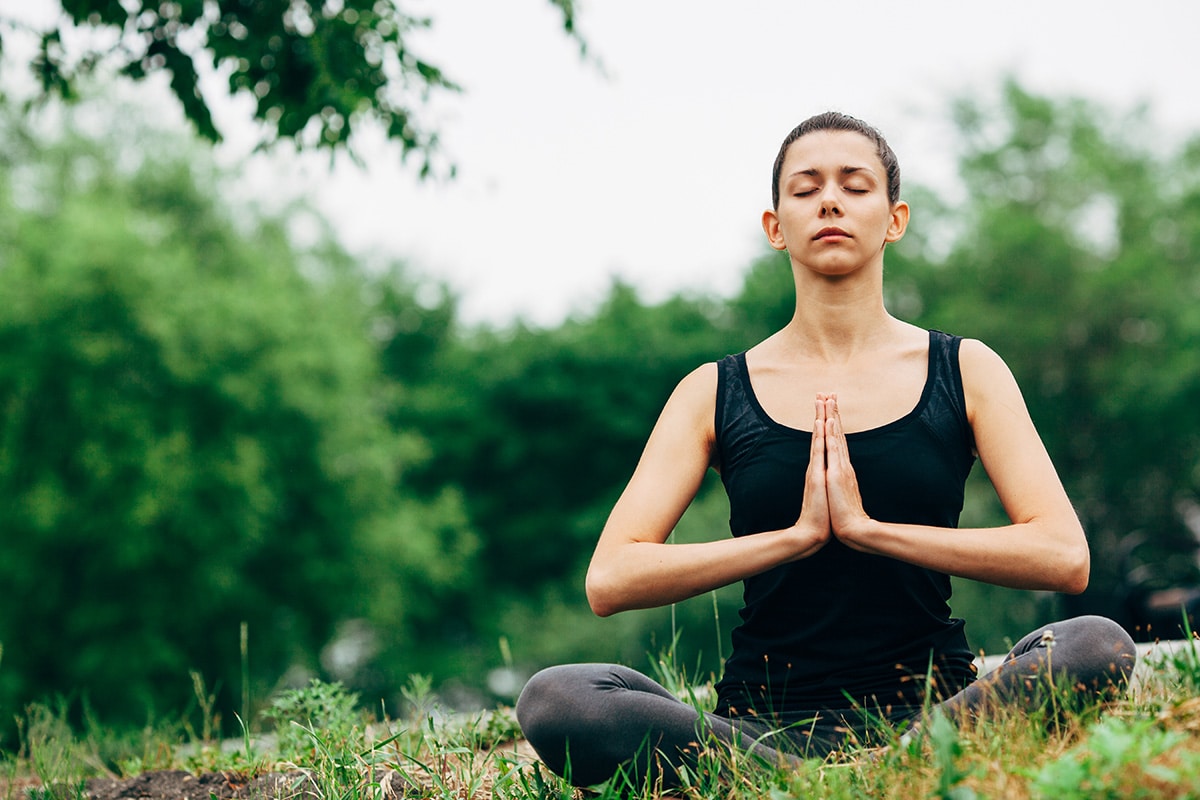As you enter a new day of social distancing, you may be wondering how to cope with COVID-19 – especially if you are also managing a mental health condition. Fortunately, there are a few proven ways to protect your mental health and stay busy while you’re at home.
As the effects of the COVID-19 pandemic continue to play out on a global scale, chances are you are reading this article from wherever you’re doing most of your social distancing. For many people, the scale, stakes, and response to COVID-19 is unprecedented, and you may be starting to feel the effects of this rapid shift both in your personal lifestyle and the state of the world. This can include struggling to figure out how to structure your days, stay healthy, and maintain clarity and a positive outlook.
If you’re also living with a mental health condition, you might be facing some additional challenges moving forward as stress and uncertainty often act as triggers. For those struggling with depression, you may feel even more exhausted and overwhelmed by all the extra sanitary measures being asked of you. If you have anxiety, you might be feeling more susceptible to panic attacks and have an underlying feeling of dread that leaves you unsure of what to do and where to start.
No matter what condition you are currently managing, there are coping methods available that are healthy, useful, and immediately applicable. By incorporating healthy habits and practices into your day now, you can mitigate stress and its impacts on your mental wellbeing.
1. Get Up and Get Going
Though you may be spending far more time at home than you used to, resist the urge to live out your days in your pajamas. What may seem relaxing at first can actually demotivate you and leave you feeling at a loose end. Routines and a clear sense of purpose are absolutely essential in managing mental health conditions, and disrupting these can trigger stress-based responses.
Instead of just getting up when you feel like, try to get up around your regular wake-up time – or a bit later if it allows you a fuller night’s rest – and carry on with your morning schedule as you typically would. Shower, get dressed, and make sure you get a good breakfast. Have an idea of what you’d like to accomplish that day, and try to get started on it early. Getting going in the morning will help set the pace for the rest of the day.
2. Mindfully Connect with Your Surroundings
Being thrust into isolation can make you feel like you’ve suddenly been launched into outer space. The lack of a defined timeline for social distancing and broader lockdowns can compound that floating feeling. It can be helpful to remind yourself that you are still in familiar surroundings, you’re just spending time in them in a different way. Reconnecting with your space can help you get grounded and focused.
Are there home projects that you’ve put on the back-burner because you just didn’t have the time? There’s no time like the present to get them started. Trying to figure out how to make working from home productive? Consider how to set up a workspace. If it helps, build a schedule around using this space just as you would a regular workday.
3. Get Active
Depending on where you live, you may have access to the great outdoors. If you do, get out and take a walk. Going outside and exercising has been long proven to boost mood and improve mental health, along with all the other physical benefits of exercise, fresh air, and a healthy dose of sunshine.
If a walk in the park isn’t doable at the moment, open a window, stand on a balcony, or sit out on the stoop for a bit each day. Create a space in your home where you can do some stretching or exercise – even 15 minutes of exercise twice each day has proven mental and physical health benefits, and can transform the way you feel.
4. Find a Way to Help
Inaction compounds the common feeling of helplessness that tends to accompany large-scale crises. Engaging in concrete actions to support others reaffirms a sense of control and purpose, and at this critical moment there are so many actions that truly matter. Dig deep and ask yourself what you can do; you don’t have to come up with something epic – the critical piece is just doing something. It could be as simple as:
- continuing to put your community first by following health protocols and social distancing guidelines even if you are healthy
- making donations to support those at risk
- reaching out to friends, family or coworkers that are struggling
- engaging in local initiatives designed to strengthen resiliency
Remember that finding solidarity in times of need is both rewarding and necessary.
5. Manage Your Information Intake
The constant flow of information, stories, and opinions found on the internet or 24-hour news channels can pose significant challenges to those already struggling with mental health issues. While keeping updated and informed about how we can take care of ourselves and others is important, it is equally important not to let a barrage of news overwhelm us to the point of endangering our wellbeing.
If you are having trouble self-regulating your media intake, consider trying to schedule times to check the news, and set a time limit for surfing. If you find yourself troubled by what you’re hearing, try to shift to some positive coverage or reach out to a loved one to talk it out.
6. Stay Connected
The disturbance of our regular socialisation patterns caused by social distancing can also cause additional stress and shake up long-established networks of support. You might be feeling quite empty without the daily interactions with co-workers, after-work appetisers with friends, or chats at the gym post-workout. For those struggling with social anxiety, you might initially be enjoying the quiet, but also losing important ground gained by engaging in regular interactions.
Mental health conditions across the board are generally exacerbated by isolation, and therefore maintaining interpersonal connections is critical. Reaching out to family and friends during this time over social media, video chat or phone is critically important in keeping your social networks strong and constant, and it ensures that a support system is available when you experience higher stress levels or a reoccurrence of a mental health issue.
Strengthening Mental Health at The Dawn

The Dawn Wellness Centre and Rehab in Thailand offers compassionate, inpatient treatment for those struggling with managing a mental health condition. At our mental health retreat we offer a specialist programme that helps clients feel better almost immediately; while gaining a true understanding of their symptoms and learning skills to manage their condition. We take a holistic approach to treatment, seamlessly blending Western psychotherapeutic techniques with proven Eastern wellness practices to foster overall health and a strong mind-body connection that is critical for maintaining good mental health.
A Safe, Relaxing Environment with Personal Care
Our beautiful riverside location is situated just outside the city of Chiang Mai, Thailand. Licenced by the Thai Ministry of Health, our resort-like facility purposely keeps client numbers under 35 so that each client benefits from personalised, attentive care. Clients will feel welcomed, valued, and confident that they can access support whenever they need it.
If you need support in learning how to best manage a mental health condition, call us today to find out more about how The Dawn can help.
Related Posts
 The Hidden Toll: The Mental Health Aftermath of COVID-19
With so much attention directed towards the immediate physical impacts of the COVID-19 pandemic, it’s easy to forget that this crisis is behind a surge in depression, anxiety, and other...
The Hidden Toll: The Mental Health Aftermath of COVID-19
With so much attention directed towards the immediate physical impacts of the COVID-19 pandemic, it’s easy to forget that this crisis is behind a surge in depression, anxiety, and other...
 What COVID-19 Means for Your Recovery: Understanding the Pandemic’s Link to Addiction
In just a few short months, COVID-19 has completely changed our lives. For those in recovery from addiction, the drastic impacts to daily routines and coping methods can be particularly...
What COVID-19 Means for Your Recovery: Understanding the Pandemic’s Link to Addiction
In just a few short months, COVID-19 has completely changed our lives. For those in recovery from addiction, the drastic impacts to daily routines and coping methods can be particularly...
 Coping with COVID-19: 10 Ways to Stay Positive While Staying Put
The world we’re living in has changed rapidly over the last few weeks. Adjusting to our new reality can be stressful, but there are ways to cope with Covid-19. Consult an...
Coping with COVID-19: 10 Ways to Stay Positive While Staying Put
The world we’re living in has changed rapidly over the last few weeks. Adjusting to our new reality can be stressful, but there are ways to cope with Covid-19. Consult an...
 Agoraphobia: The Mental Health Condition Prince Harry Struggles With
For those struggling with agoraphobia like Prince Harry, fear of being in public spaces can make people prisoners in their own homes. However, like many mental health disorders, agoraphobia is...
Agoraphobia: The Mental Health Condition Prince Harry Struggles With
For those struggling with agoraphobia like Prince Harry, fear of being in public spaces can make people prisoners in their own homes. However, like many mental health disorders, agoraphobia is...





